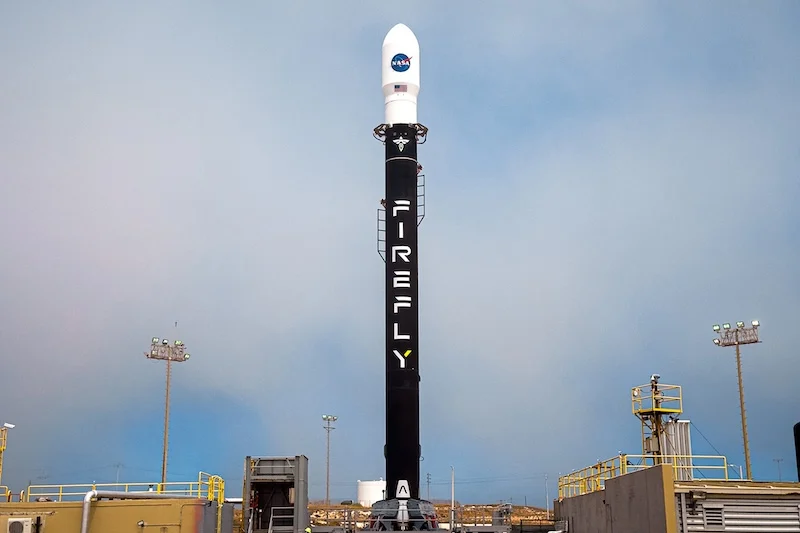Firefly Aerospace Raises IPO Price Range, Eyes $6.3 Billion Valuation Amid Space Tech Momentum
Firefly Aerospace Raises IPO Price Range, Eyes $6.3 Billion Valuation Amid Space Tech Momentum
By
Rachel Steinberg
Last updated:
August 5, 2025
First Published:
August 5, 2025

Photo: Aviation Week
Firefly Aerospace has increased the price range for its upcoming initial public offering (IPO), signaling strong investor demand and growing confidence in the future of commercial space exploration and defense-tech.
The Texas-based aerospace company now expects to price its shares between $41 and $43, up from its previously stated range of $35 to $39, according to an updated filing submitted on Monday.
This adjustment pushes Firefly's projected valuation to more than $6.3 billion, up from the earlier target of around $5.5 billion.
What Firefly’s New IPO Range Means
At the top end of its updated price range, the IPO could raise up to $697 million, marking a significant jump in proceeds for the company. This move comes amid renewed enthusiasm for space technology stocks, especially as traditional IPO activity slowly rebounds after a multi-year slowdown.
Firefly’s decision to revise its IPO pricing reflects the company’s strong positioning in both the commercial and defense aerospace markets, as well as investor appetite for growth in the new space economy.
Company Profile: A Rising Star in Space Infrastructure
Founded in 2014 and headquartered in Cedar Park, Texas, Firefly Aerospace develops a variety of spaceflight solutions, including:
- Alpha rockets for small satellite launches
- Lunar landers designed for NASA and commercial missions
- Orbital transfer vehicles, also known as space tugs
These vehicles are designed to help position satellites in orbit after they’re launched, and support national security, commercial communications, and scientific missions.
Strategic Partnerships with Defense and Aerospace Leaders
Firefly has aligned itself with some of the most influential players in the defense and space sectors:
- NASA has selected Firefly’s lunar lander for its CLPS (Commercial Lunar Payload Services) program
- Lockheed Martin and L3Harris have established partnerships
- Northrop Grumman invested $50 million into Firefly in a 2023 funding round
These partnerships help validate Firefly’s technology and give it access to larger government contracts and launch missions.
Financial Snapshot: Revenue Soars, Losses Widen
Firefly's rapid growth is reflected in its top-line numbers:
- Revenue grew to $55.9 million as of March 2025, up from $8.3 million a year earlier
- However, net losses also increased to $60.1 million, compared to $52.8 million the year before
The rising losses, though common in capital-intensive aerospace startups, may still raise concerns among conservative investors looking for a clear path to profitability. Still, Firefly appears to be betting that its expanding contract pipeline and technical capabilities will justify the short-term burn.
A Hot Market for Space IPOs
Firefly’s IPO follows a wave of renewed interest in space tech firms tapping public markets. In June, Voyager Space made its own public debut, marking a return of IPOs in the space sector after a nearly two-year drought.
Meanwhile, SpaceX, though still private, has continued to drive enthusiasm and venture capital investment into the broader sector, lifting the valuations and investor sentiment for peers like Firefly, Rocket Lab, and Astra.
According to PitchBook, venture capital investment in space-related companies hit $8.9 billion in the first half of 2025, up 46% year-over-year.
What's Next
Firefly’s IPO will be a closely watched barometer for how public markets value early-stage aerospace and defense technology companies. If demand remains strong and the offering prices at the top of the range—or higher—it could set a precedent for other private space startups considering a public debut in 2025 and beyond.
Popular articles
Subscribe to unlock premium content
Global Cultures and the Hidden Drivers of Productivity and Happiness

The Future of Personalized Medicine

Digital Nomads and the New Global Economy

Global Cultures and the Hidden Drivers of Productivity and Happiness

The Future of Personalized Medicine

Global Cultures and the Hidden Drivers of Productivity and Happiness









